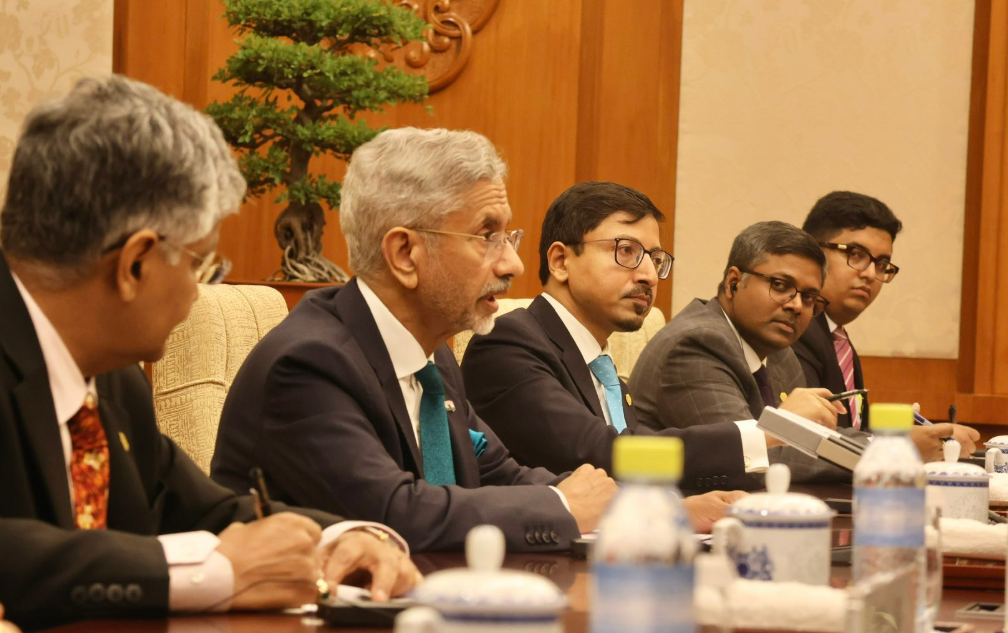
India’s External Affairs Minister Dr. S. Jaishankar is currently in China to participate in the Meeting of the Council of Foreign Ministers under the Shanghai Cooperation Organization (SCO). However, even before the multilateral talks began, Jaishankar held a crucial bilateral meeting with his Chinese counterpart, Wang Yi. The discussions revealed a clear pattern that has defined India-China diplomacy in recent years: a strong reiteration of national red lines, wrapped in a diplomatic language of cooperation.
During the meeting, Jaishankar underlined India’s position that competition between the two Asian powers should not be seen as conflict. He reiterated that a cooperative and mutually respectful relationship is essential for regional stability. He emphasized that India wants to see progress in ties but firmly pointed out that until the border tensions are resolved, the broader relationship cannot return to normalcy. This remark once again highlighted India’s long-standing stance that peace and tranquility along the Line of Actual Control (LAC) is the foundation for any meaningful progress in bilateral relations.
On the other hand, Chinese Foreign Minister Wang Yi responded by urging both sides to build mutual trust rather than suspicion. He stated that instead of competing to outdo each other, China and India should aim for cooperative development. According to Wang, nations should not attempt to defeat one another but instead achieve success together. His comments reflected China’s strategic narrative that emphasizes diplomacy, shared growth, and the avoidance of open conflict—though this is often perceived in India as a tactic to downplay serious ground-level tensions.

Wang Yi emphasized China’s willingness to implement the high-level consensus reached by both leaderships. He said that China is ready to enhance strategic communication, political trust, and bilateral exchanges. According to him, China seeks to expand cooperation in multilateral platforms such as the SCO and handle differences appropriately in the overall context of India-China relations. His tone was conciliatory, but it carried an undercurrent of strategic messaging meant to present China as a stable and responsible power amid global shifts.
At the same time, Jaishankar clearly reminded the Chinese side that while recent talks have led to some progress, the road ahead remains challenging. He stressed the need for continued hard work to resolve the remaining border issues and move towards genuine normalization of ties.
Wang also made broader geopolitical comments. He argued that the international environment is undergoing significant changes and criticized the growing trend of unilateral protectionism and coercive tactics by major global powers. In this context, Wang described India and China as two great Eastern civilizations and key emerging economies, suggesting that their cooperation can offer a model of peaceful coexistence and mutual success.
According to him, China is committed to defending the global multilateral trading system, stabilizing production and supply chains, and fostering an open and cooperative international environment. Wang expressed China’s readiness to work with India to promote inclusive economic globalization, protect the shared interests of the Global South, and enhance regional peace, stability, and prosperity through greater communication and coordination.
However, despite these repeated signals of engagement from the Chinese side, India remains cautious. The long-standing issue of China’s support to Pakistan, especially on matters concerning India’s sovereignty and security, continues to strain bilateral trust. China’s backing of Pakistan in international forums and its involvement in strategic infrastructure projects in Pakistan-occupied Kashmir remain major irritants for New Delhi.
While both sides are speaking the language of diplomacy and development, India is firmly on alert. The consistent message from Minister Jaishankar has been that mutual respect and resolution of outstanding issues—especially at the border—are prerequisites for any substantial improvement in ties. Until that happens, India is unlikely to lower its guard.
The current meeting, taking place on the sidelines of a multilateral forum, is part of an ongoing process of engagement. Yet it remains to be seen whether this round of diplomatic dialogue will bring about any real breakthrough or merely maintain the status quo.
Disclaimer:
This article is based on official statements and diplomatic developments reported in public domain sources. The views presented are for informational purposes and do not reflect the official stance of any government.




